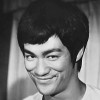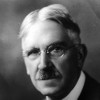“ Knowledge results if the mind discriminates and combines things as they are united and divided in nature itself. ”
John Dewey, Democracy and Education (1916). copy citation
| Author | John Dewey |
|---|---|
| Source | Democracy and Education |
| Topic | mind self-knowledge |
| Date | 1916 |
| Language | English |
| Reference | |
| Note | |
| Weblink | http://www.gutenberg.org/files/852/852-h/852-h.htm |
Context
“On the one hand, the outer world presents the material or content of knowledge through passively received sensations. On the other hand, the mind has certain ready powers, attention, observation, retention, comparison, abstraction, compounding, etc. Knowledge results if the mind discriminates and combines things as they are united and divided in nature itself. But the important thing for education is the exercise or practice of the faculties of the mind till they become thoroughly established habitudes. The analogy constantly employed is that of a billiard player or gymnast, who by repeated use of certain muscles in a uniform way at last secures automatic skill.”
source


